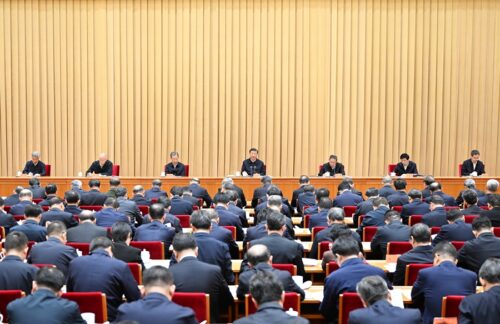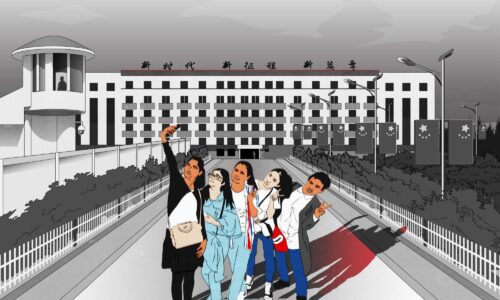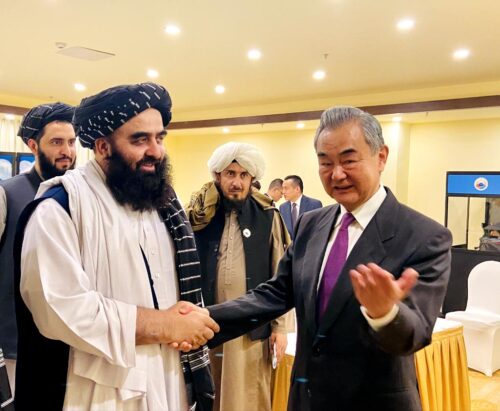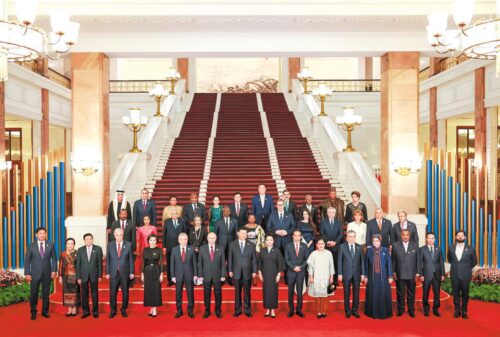Xi Jinping orders officials to persist with hard-line Xinjiang policies
On his way home from the BRICS summit in South Africa, China’s leader stopped off in Xinjiang, where he urged senior Party officials to persist with harsh policies intended to “Sinicize” Islam and the culture of Uyghurs, Kazakhs, and other ethnic groups.
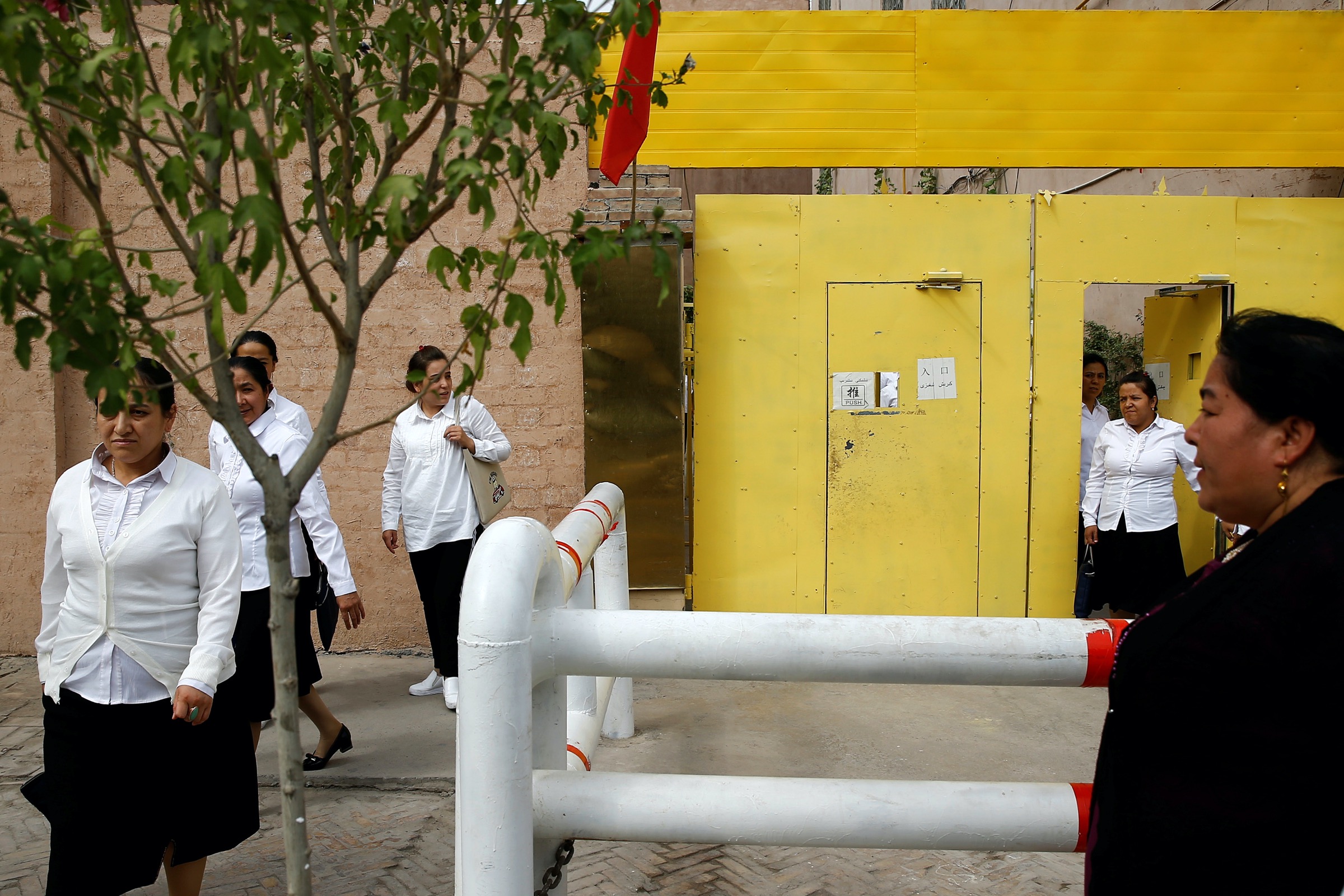
Chinese leader Xí Jìnpíng 习近平 stopped in Ürümqi, the capital of the Xinjiang Uyghur Autonomous Region, on August 26, on his way back to Beijing from a state visit to South Africa, where he had attended a meeting of the BRICS bloc.
In Ürümqi, Xi listened to work reports from the Xinjiang Communist Party Committee, and the Xinjiang Production and Construction Corps, a paramilitary organization that is the largest employer and landowner in Xinjiang, and has its fingers in almost everything that happens in the region, from farming to cotton processing to the recruitment of migrants from other parts of China.
Xi gave a speech that was reported as the lead story on the English and Chinese websites of state-owned Xinhua News Agency, and the first segment on the prime-time news program of state broadcaster CCTV.
Pretty pictures
The CCTV segment showcased Xinjiang’s agricultural products, especially walnuts and cotton, wind and solar energy, tourism, Uyghur traditional dancing, poverty alleviation, and industry — including footage from a car factory using robots made by ABB, a Swiss multinational company.
CCTV also highlighted domestic and international tourism, and Xinjiang’s role as a key transport hub of the Belt and Road Initiative (BRI), Xi’s signature global infrastructure and commerce project.
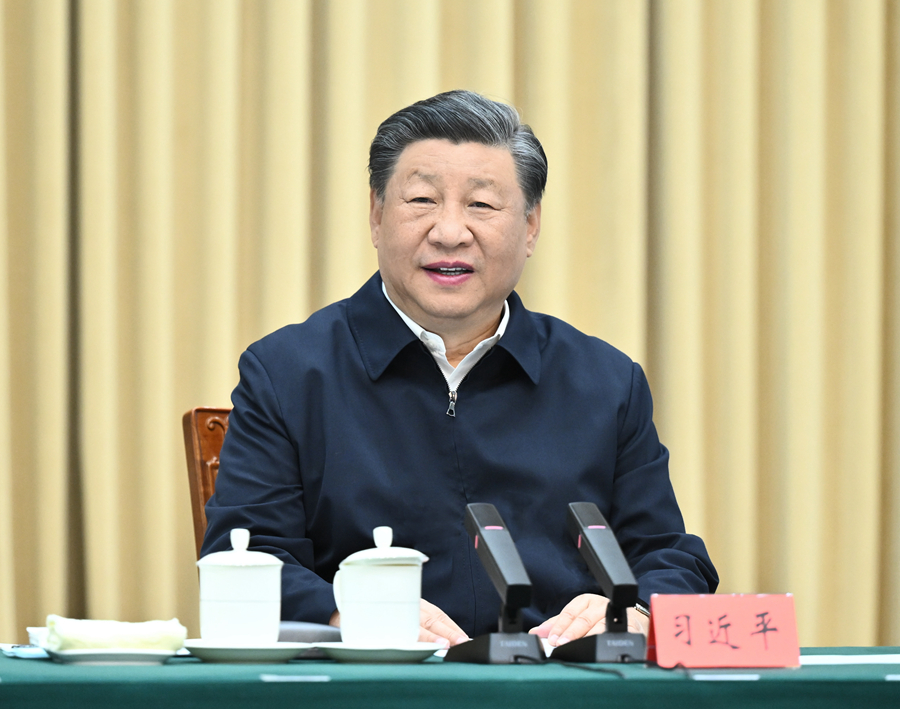
Xi’s plans for Xinjiang
Xi’s strategic vision for Xinjiang is articulated even more clearly by the text reports from Xinhua. Xi “affirmed the achievements” already made in Xinjiang, and said that the governance of the region is closely tied to the “overall situation of national rejuvenation.” He said that “social stability” was key, and urged officials to ensure it by “making good use of legal weapons” (用好法律武器). He demanded that officials “accelerate the development of military-local integration (加快推进兵地融合发展).
Xi said Party officials should “go deep into the grassroots and the masses” to “combine the anti-terrorism and anti-separatist struggle with…the normalization of stability maintenance work.” He said it was “necessary to further promote the Sinicization of Islam and effectively control various illegal religious activities,” and to “build a sense of the Chinese nation’s community,” which involved “resolutely promoting education in the national standard spoken and written language,” (i.e., Mandarin, not Uyghur or Kazakh or other languages spoken by many of Xinjiang’s residents).
A campaign to “Sinicize Islam” has been running for several years already: It includes the destruction of mosques built in Arabic or other West Asian architectural styles and their replacement with structures that look more “Chinese,” censorship of religious and cultural books, websites, and films, and the removal of public signage in Uyghur, Kazakh, and other non-Chinese languages.
Xi said that Xinjiang should “speed up the construction of the Belt and Road core area,” and accelerate poverty alleviation.
He said Xinjiang should be “a bridgehead for China’s westward opening,” construct “water conservancy facilities and optimize the allocation of water resources, and actively develop modern agriculture and photovoltaic industrial parks.” He said there should be more domestic and international tourism to Xinjiang, and that people and companies should be encouraged to move from Xinjiang to other parts of China and vice versa.
Xi Jinping “emphasized that it is necessary to strengthen positive publicity…and refute all kinds of false and negative public opinion, and harmful speech…through multiple channels and forms.”
Xi said officials should “adhere to…the ‘Fengqiao Experience,’” a reference to a 1960s political campaign under Máo Zédōng 毛泽东 to purge China of “four reactionary elements” (四类分子): “landlords, wealthy peasants, counterrevolutionaries, and evildoers.”
What does this all mean?
The translator and scholar of Xinjiang and Uyghur culture, author of In the Camps and other books, and contributor to The China Project, Darren Byler said that the speech appears to indicate that Xi “is doubling down on current policies.”
The current policies have been in place since 2016, when Chén Quánguó 陈全国 became the region’s Party secretary — the highest leadership position in the province — after five years leading the Tibet Autonomous Region. His hard-line tactics in Tibet are said to have recommended him for the top job in Xinjiang, where sporadic violence had been increasing since the 2009 riots in Ürümqi.
Chen’s rule of Xinjiang began a campaign of indoctrination and suppression of Turkic culture and Islamic practices, and mass internment that has involved the detention of likely more than a million Uyghurs.
When Chen was replaced in 2021 by Mă Xīngruì 马兴瑞, an actual rocket scientist who was moved from his position as governor of the prosperous and cosmopolitan province of Guangzhou, some speculated that the change of leadership might mean a relaxation of repressive measures. But Xi’s speech has ended any such thinking:
“By naming social stability and counterterrorism first, before the BRI development, he is placing slightly more emphasis on security than Ma Xingrui did in his first speeches as Party Secretary of the region,” Darren Byler told The China Project.
Xi is also acknowledging the damage that Beijing’s Xinjiang policies have done to China’s international image: “By calling for propaganda that explicitly refutes research and reporting that contradicts the official state narrative regarding the mass internment campaign, he is also signaling that such reports are having an effect that requires a response,” Byler said.
Xi’s hard line
Xi may be aware of the negative publicity his government’s Xinjiang campaigns are generating, but his weekend visit to Ürümqi showed that he only intends to double down. This intention was made explicit by the list of senior officials who listened to Xi’s speech and were named in state media reports.
Aside from Ma Xingrui, the top leader of Xinjiang, a variety of senior officials attended the meeting with Xi. They include:
- Cài Qí 蔡奇, China’s fifth most powerful official and Politburo Standing Committee member;
- Wáng Yì 王毅, the country’s top diplomat;
- Shí Tàifēng 石泰峰, head of the United Front Work Department, which directs propaganda and influence campaigns inside and outside of China;
- Lǐ Gànjié 李干杰, the head of the powerful Organization Department of the Chinese Communist Party, which is in charge of appointments and personnel;
- Hé Wèidōng 何卫东, a general of the People’s Liberation Army (PLA) and vice chairman of the Central Military Commission;
- Hé Lìfēng 何立峰, the director of the Office of the Central Financial and Economic Affairs Commission since March 2023, who has just returned from a trip to Pakistan, which borders Xinjiang;
- Chēn Wénqīng 陈文清, a spy chief who previously led the Ministry of State Security, and is now secretary of the Central Political and Legal Affairs Commission; and
- Wáng Xiǎohóng 王小洪, the Minister of Public Security.
The roles of these officials are connected to the future of the Party’s Xinjiang strategies. Beijing will continue to promote its current policies in domestic and foreign-directed propaganda, and using China’s diplomatic powers. The state will continue hard-line campaigns to encourage Uyghurs and other minorities to assimilate to Han Chinese culture, and leave behind Muslim and other cultural traditions aside from some dancing.
Asked about Xi’s speech and the significance of its audience, the noted Sinologist Geremie R. Barmé told The China Project, “Just when you thought things could not get any worse, they tighten the screws a bit further.”

